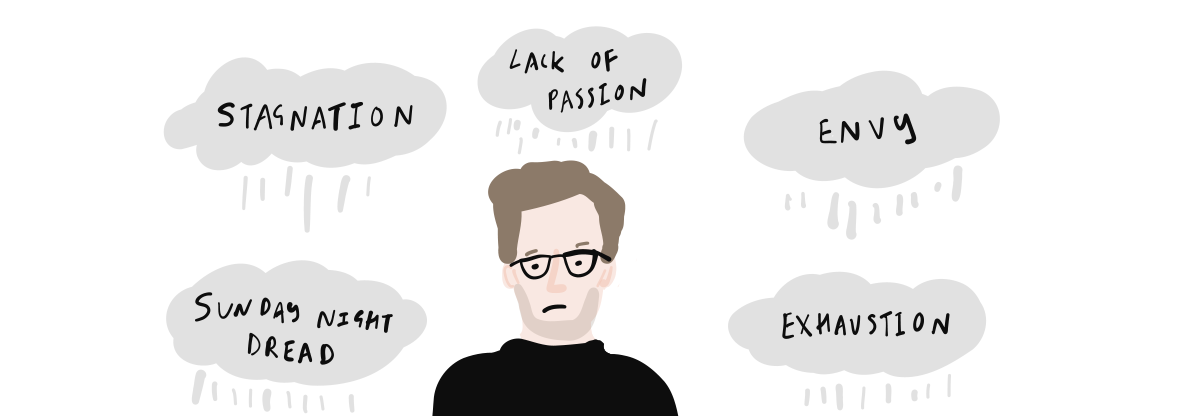8 Signs You Need a Career Change

Have you ever experienced that unsettling feeling of an unfulfilling job? You’re not alone, it happens – and it might signal that you need a career change.
Many of us hit a point in our careers where we feel bored, stuck or just simply unchallenged at work. The good news? Recognising that you’re in this rut is the first step. But here’s the thing: diving into the unknown world of career changes can feel confusing. A 2021 City and Guilds study revealed that a third of Brits want to change careers but have no idea where to start.
It’s okay to be confused and nervous. Career shifts come with their share of stress and uncertainty. But imagine the joy of doing something you genuinely love! A fulfilling job isn’t just a paycheque, it boosts our overall wellbeing. As the saying goes: “Find a job you love and you’ll never have to work a day in your life.”
If you’re on the fence about your job, stick around. We’ll walk through some surefire signs you need a career change. Remember, with the right support and guidance, the journey can be made smoother. Let’s get started.
Do I Need a Career Change?
Change is the only constant in life and this especially holds true for our careers. Over time, what once excited us might become mundane or even exhausting. So how do you recognise when it’s not just a passing phase but a sign that you genuinely need a career change?
Take Time to Reflect
Pause and take a moment to reflect on how you feel about your job. Is it just the Monday blues or does the thought of going to work fill you with dread every single day? Are you still enthusiastic about your projects or do you find yourself constantly watching the clock? Listen to these feelings. They’re your internal compass pointing towards the fact that you might well need a career change.
Know It’s Natural for Careers to Evolve
Careers, much like life, are fluid. The job that once seemed like a perfect fit might now feel restricting or off-track. As we grow and evolve so do our skills, passions and aspirations. Sometimes, the career we started might not accommodate this growth, leading to feelings of stagnation. For example, a creative writer might feel confined in a technical documentation role, or a software engineer might discover a latent passion for digital marketing. It’s natural. Our professional paths aren’t always linear and that’s okay.
Rise From the Rut
Staying in a job where you feel stuck or unfulfilled can have a negative impact on your mental health, job performance and overall satisfaction in life. A new role or industry can reignite your passion, challenge you and open doors to opportunities you hadn’t previously considered. More than anything, it can bring back the joy and motivation of working towards something you truly believe in.
So if you’re feeling out of sync in your current role, it might be time to ask yourself: is this just a phase or do I need a career change? It’s not about running away from your current job but instead about running towards something that resonates more with your new aspirations.
8 Tell-Tale Signs It’s Time for a Career Change
Recognising that you might need a career change is about reading the signs. While everyone’s journey is unique, some common indicators hint it might be time for a professional shift.
1. Consistent Sunday Night Dread
If the thought of Monday morning constantly fills you with anxiety and dread, it’s more than just the ‘Monday blues’. A persistent feeling of not wanting to start the week can be a clear sign that you’re not satisfied or engaged with your job anymore and is one of the top signs you should change careers.
2. Lack of Passion or Enthusiasm
Remember the days when you used to be excited about projects and tasks? If you can’t recall the last time you felt enthusiastic about work or if tasks feel more like burdens, it’s a sign your passion has dwindled. A job without passion can quickly lead to burnout.
3. Stagnation and No Growth
Feel like you’re just going through the motions without learning or growing? If there are no new challenges or opportunities for advancement, it might be a sign that you’ve outgrown your current position or company and that you need a career change.
4. Physical or Mental Exhaustion
It’s natural to feel tired after a long day. However, if you’re constantly drained or mentally fatigued even after regular workdays, it might indicate a deeper dissatisfaction. Prolonged stress can have severe health implications. When it comes to your health and wellbeing, this is one of the clear signs you need to change careers.
5. Envy of Others’ Careers
If you often find yourself envying friends or acquaintances for their jobs or roles, it might be a nudge to reassess your career. This could indicate that you’re yearning for a change or a particular role you find more appealing.
6. Misalignment with Company Values
Over time, company cultures and values can evolve. If you find that your personal values and beliefs no longer align with those of your company, it can lead to dissatisfaction and the feeling of not ‘fitting in’. There will be companies out there that align more closely with your values, so seek them out.
7. Your Skill Set Isn’t Utilised
Everyone has a unique set of skills and strengths. If you feel that your talents are underutilised or not acknowledged, it could mean you’re in the wrong role and need a career change. Everyone deserves a job where their skills are appreciated and where they can shine.
8. Constant Daydreaming About Other Careers
If your day is frequently interrupted by fantasies of being in a different job or industry, it might be more than just harmless daydreaming. When the allure of another profession occupies your thoughts regularly, it may be your mind’s way of signalling its desire for a change.
If one or more of these common signs it’s time for a career change resonates with you, take some time to reflect and consider seeking advice. A new career might just be the refreshment you need!
Need a Career Change? What To Do Next
Leaping into a new career can be both exhilarating and nerve-wracking. While the thrill of diving into something new is enticing, the journey is smoother when you’ve planned and prepared. After all, changing careers isn’t just about leaving a job, it’s about reinventing your professional self. Here’s a step-by-step guide to help you navigate your next steps when you need a career change:
Step 1: Deciding What Job You Really Want
Before diving headfirst into job applications, take a moment to reflect on what you truly want. What was lacking in your previous role? What are your passions and strengths? Sometimes it’s not about a new career but a different role in the same industry. Identify what will genuinely make you happy and fulfilled.
Step 2: Networking: The Power of Connections
The old saying ‘it’s not what you know but who you know’ holds a lot of weight, especially when changing careers. Reconnect with old colleagues, attend industry events or join online communities relevant to your desired field. Building these connections can provide valuable insights and open doors to unadvertised job opportunities.
Step 3: Evaluating Necessary Qualifications
Switching to a new role or industry might require you to gain new skills or certifications. Research the qualifications necessary for your desired job. Do you need to upskill with a short course or reskill with more comprehensive training? Remember, while qualifications can give you an edge, they’re often a complement to passion and experience.
Step 4: Preparing to Make a Career Change
Embarking on a career change comes with its own set of challenges.
- Financially – make sure you have a safety net, especially if there might be a period of unemployment
- Mentally – be prepared for rejections and setbacks. They’re part and parcel of the process unfortunately
- Finally – update your CV, tailor your cover letters and seek the advice of a mentor or a career coach to ensure you’re presenting yourself in the best light for your new chosen field.
A career change is more than just a switch; it’s a journey of rediscovering your professional self. While the path might have its obstacles, with a structured approach, determination and a bit of guidance, you’ll find yourself on the road to a job that brings you joy and fulfilment.
Make Your Career Change With the Help of a Career Navig8r
When you know you need a career change and are navigating the first steps on your journey, it can feel like swimming in uncharted waters. While there’s a wealth of general advice out there, nothing beats personalised guidance from someone who’s already been in your shoes. Think about it this way, if you wanted to be a big tech CEO, wouldn’t you want insights from someone like Mark Zuckerberg or Bill Gates?
From expert advice tailored to your needs to networking opportunities and invaluable shared experiences, a mentor can be the compass you need. Unsure about that upcoming interview? Need a second opinion on your career move? Or just want confirmation that you’re on the right track?
With a mentor, you’re not only learning from their successes but also their mistakes. So, if you’re seeking expert advice for the next phase of your career or just want that added assurance, don’t do it alone. Find your Career Navig8r today.


